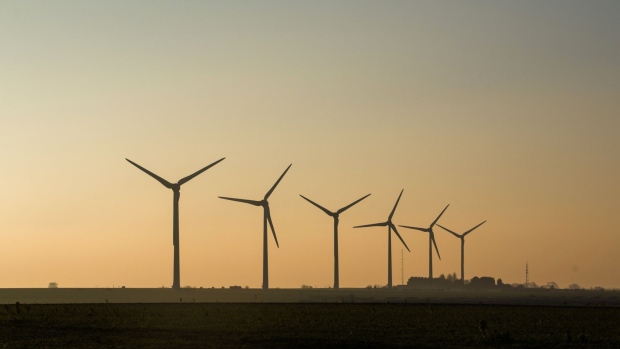Jun 9, 2022
Renewable Power Still in the Crosshairs of UK Windfall Tax
, Bloomberg News

(Bloomberg) -- Renewable generators are still in the crosshairs of UK government officials drawing up proposals for a windfall tax on the profits of electricity producers.
The Chancellor of the Exchequer, Rishi Sunak, said this week he’s looking at how to impose a tax on power profits and a decision could come within weeks. The Treasury is considering including clean generation within the scope of the levy because this capacity is also benefiting from high power prices, according to two people familiar with the matter.
The government last month imposed a 25% levy on the profits of North Sea oil and gas firms to help fund support for Britons facing a cost-of-living crisis. But it stopped short of extending the levy to electricity generators because of bigger market reforms already in the works, while the power industry raised concerns that a tax will discourage investment in green energy.
Sunak told a parliamentary committee this week that “extraordinary profits” are being made in the power sector as a result of the market price of electricity being set by the most expensive technology, which is currently natural gas. There are lots of producers whose costs are much lower than that, he said.
“That is where these excessive extraordinary profits arise, we’re working urgently with industry to understand the scale of what those might be,” he said.
Wind Farms
The sector came into the spotlight after senior ministers were irked by some wind farm operators taking advantage of high market prices to make a profit, according to two people who declined to be identified because the matter is private.
Two new offshore wind farms, Triton Knoll and Moray East, which are both fully operational, have delayed the start of a subsidy mechanism that fixes the price they sell electricity. This could allow them to sell power at higher market rates.
While such a postponement is within the terms of the so-called contract for difference, it’s what led Sunak to call for the windfall tax to be extended to power generation including renewables, the people said.
Under the subsidy system designed to encourage wind-farm development, when the power price is higher than the agreed strike price of the agreement, the generator must pay the difference to the UK’s Low Carbon Contracts Company. By delaying the start, the government misses out on revenue that instead goes to the generators.
Such contracts take account of delays during construction, which Triton Knoll experienced due to Covid, the project’s partners said in a statement. Part of Triton Knoll has already begun its CfD contract, but another won’t start until April 1, they said. Triton Knoll is jointly owned by RWE AG, J-Power and Kansai Electric Power.
Spokespeople for Moray East wind farm didn’t respond to Bloomberg’s request for comment. The project’s contract start date is set for March 31, according to data on the LCCC website.
©2022 Bloomberg L.P.






